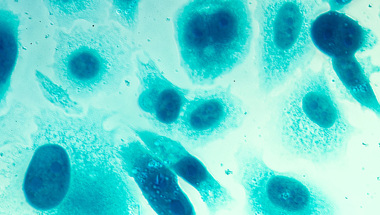
Finding the men most likely to benefit from a new prostate cancer treatment

Grant information
Researcher: Dr Kelly Coffey
Institution: Newcastle University
Award: £363,881
Reference: RIA19-ST2-005
What you need to know
- Building on her work from a previous Prostate Cancer UK grant, Dr Kelly Coffey from Newcastle University has identified a family of proteins called kinases which play an important role in prostate cancers growing and developing resistance to existing hormone therapies.
- Dr Coffey aims to identify which of these kinase proteins are most associated with driving prostate cancer growth and then develop a tool to detect these in an individual.
- Her tool could be used to determine which men might benefit most from novel drugs targeting these kinase proteins.
We hope to develop this into a diagnostic tool that can tell us which kinases are most active in each individual cancer, so we know which drugs would be most beneficial for each man.
Kinase proteins are key to controlling cell growth
Kinase proteins are important as they control and regulate cell growth. Each cell has a unique blueprint housed in its DNA. However, specific changes to this blueprint can disrupt how these kinase proteins are made and alter the job they perform in the cell. As a result, these changes can make prostate cells grow uncontrollably, leading to cancer development.
Previous studies have shown that drugs can be used to block these kinases and stop the cancer growing. However, clinical trials in other cancer types have shown that not all patients respond to this treatment. This could be because the activity of these kinase proteins differs between individuals, and therefore a drug effective at stopping one particular kinase protein from working may be effective in one patient, but may not work in another.
Developing a treatment personalised to each man
In this project, Dr Coffey and her team will develop and test a new method to detect which specific kinase proteins are present and working unchecked in prostate cancer, and investigate which particular kinase proteins are associated with aggressive cancers.
Having identified which kinase proteins are present, they’ll analyse prostate tissue samples in the lab to see if drugs which block the activity of these kinase proteins can stop the cancer cells from growing. This will give them an idea of which combination of drugs might be the most effective at stopping the cancer from progressing.
More studies needed to test new treatment options
By the end of the project, the team will have developed a new test to tell whether a man might benefit from receiving additional treatment with kinase-targeting drugs. This could lead to a more tailored and precise treatment approach for each man based on the characteristics of his cancer. The next step will be to test this in a clinical trial.



